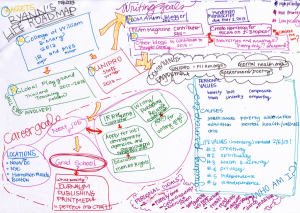7 Helpful Tips for the Job Search
Long gone are the days of cold calling (and emailing)! It’s time to take matters into your own hands, with a refreshed perspective.
By now, I’m sure you’re all experts at applying to college (and maybe internship and jobs as well). However, there are some things we may overlook or forget. Below are seven tips for all those navigating, or preparing to navigate, through the seemingly stagnant sea of unemployment. These tips are also for those seeking an alternate route from their current career path. The following aren’t necessarily a perfected formula to get you hired, nor do they lead directly to the dream job of your choosing. However these tips provide insight on how to be proactive and vigilant while steering through the job search.
1. Make a road map of everything.
If you don’t know exactly what your calling is (that’s okay, no one has it all 100% figured out during, and even after, college these days), then it’s time to take a step back. Construct a visual that encompasses you as a person. Look at the big picture. It’s more than just a resume – it’s seeing if what you already have aligns with what you envision for yourself. If they don’t, then outline the steps to get there. This can be in the form of a list, diagram, drawing, collage, or whatever helps you to visualize your goals, and the steps to reach those goals.
As you prepare to create a road map, consider the following questions: What do you want in your next job? What experience – including work, internship, volunteer and leadership – do you have? What are your most important goals and values? How can you tie in everything to lead you to those goals, while staying true to your values?
Some things you may want to highlight include your:
- Assets (degrees, work experience)
- Career Goals (graduate programs, the type of job you want, the hours you’d be willing to work, preferred environment and locations where you’d like to work)
- Interests (professional/personal interests and how you are working towards said interests)
- Guiding Principles (personal values, Life Values inventory, causes you want to stay involved with)
- Personal Goals (actions you vow to take to improve your emotional, mental, emotional and social well-being)
Try to do this exercise a couple times a year, to see if your goals are shifting and to keep track of your progress.
2. Polish off your CV (and other application essentials).
Compile a giant CV (even if they’re more so for established professionals) that contains all of your work experience, education and skills. Provide as much detail as possible (careful to not over-exaggerate or misrepresent yourself, it will catch up with you later).
For your resume: If you are exploring more than one professional field, make different versions of your resume, drawing from the comprehensive CV you already have.
For your cover letter: Again, if you are exploring more than one professional field, you’ll find it helpful to have different versions of a cover letter to tweak as needed (once a job application comes around).
3. Network with everyone, even if you don’t think it’ll lead to a job prospect.
Most jobs and gigs we get result of a connection that we have. It’s all about the people that you know. Having that road map and CV updated will help you to clearly voice your career goals, as well as the direction you’d like to go in.
Contact friends, family, professors, former employers, colleagues, mentors, etc. Update them on your interests and experience and ask for help, and to pass along any info they may come across.
Reach out to people who already specialize in a field you’re interested in. Pick apart their brain. Ask about their experience, as well as any advice they’d be willing to offer.
4. (For current students and recent graduates) Take advantage of all that the W&M Cohen Career Center has to offer (workshops, networking days, office hours, Alumni network, etc.).
Not enough students utilize the Career Center! There are many opportunities, often free! One event that graduating seniors should look out for is the Etiquette Dinner. Registration goes by a first-come, first-serve basis, and allows students to learn about proper etiquette for formal or professional meetings over meals, dinners and special events.
If you’re a recent graduate, you may use the Career Center’s resources for up to two years after graduating. Don’t squander this opportunity.
5. Apply.
Easier said than done, but it’s no use sifting through the countless applications you’ve come across if you don’t sit down and start filling out the application. And if you did Step 2, then you’re at an advantage.
6. Ace the Interview(s).
If you are notified that an employer would like to interview you, be as proactive as possible. Respond on time. Ask questions. Show that you’re genuinely interested in the position, and are looking forward to the interview.
While preparing for the interview, do your research (especially if you didn’t when you were applying). Be knowledgeable of the organization/business/firm. Know their mission statement, core values and projects they are working on. Prepare questions you anticipate the interviewer will ask you. Prepare questions you want to ask the interviewer (about the position, the organization, advice, etc.).
Following the interview, send a thank you letter (if it was a panel interview, send a letter to each individual who interviewed you), stressing your interest in the position, as well as your qualifications that would make you the best fit.
7. Follow Up.
Upon receiving a response (hiring or rejection), reply promptly and courteously. Even if you didn’t get the position, express your interest in working with the organization in the future. If the interviewer is able, ask them to notify you of future openings that they believe would be a good fit for you. Don’t sever ties with them simply because you were rejected. Maintain contact, especially if you’re still interested in that particular organization. They may even be able to refer you to other positions with other organizations. Keep your options open.
Comments are currently closed. Comments are closed on all posts older than one year, and for those in our archive.





So much of it is about networking, I cannot emphasize this enough. Get in touch with the Alumni network all you can.
Best,
Sam
Your diagram is so inspiring, and SO you Ryann! I love it. Thanks for the ideas 🙂
Thanks for your input, Sam! W&M alumni have been such a great resource for many recent grads, including myself!
And Maddy, thank you for your kind support. Hope you’ve found these tips helpful!